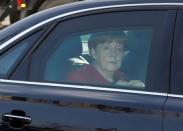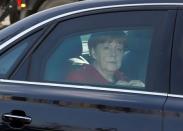Bloodied but unbowed, Merkel sticks to high-stakes migrant policy
By Paul Carrel and Michael Nienaber
BERLIN (Reuters) - Chancellor Angela Merkel vowed on Monday to press on with her migrant policy despite seeing her Christian Democrats (CDU) party punished by voters who flocked to the anti-immigration Alternative for Germany (AfD) in Sunday's three regional polls.
The electoral setbacks came just as Merkel is trying to convince her European Union partners to seal a deal with Turkey to stem the tide of migrants, which has already dwindled as countries along the main route have unilaterally shut borders and erected fences.
Merkel, who has staked her reputation on a thus-far elusive European solution to the crisis, came under renewed pressure on Monday from her Bavarian allies to make Germany's border less porous, but refused to buckle.
"Yesterday was a difficult day for the CDU," she said after a party meeting to assess the damage from the polls.
"Without a doubt, we have come a long way towards solving the refugee issue, but we still don't have a sustainable solution. I am fully convinced that we need a European solution, and that this solution needs time."
Merkel alarmed many European leaders last week by gambling on a last-minute draft deal with Turkey to stop the migrant flow, and must win their support at a summit later this week to cement the controversial plan.
PERSONAL APPROVAL
She can at least look to recent national opinion polls, including one that had her personal approval rating hitting its highest level this year, at 50 percent, just after the draft agreement with Turkey.
Some commentators also pointed out that the CDU's candidates in the western states of Baden-Wuerttemberg and Rhineland- Palatinate both moved to the right by pressing for tougher migration policies, only to be beaten by Green and Social Democrat rivals who stuck closer to Merkel's line.
However, Germans undeniably want the issue fixed quickly.
Many think their country cannot cope with an influx that saw more than a million migrants enter last year after Merkel decided to open the borders to those fleeing war in Syria.
That angst saw them turn in droves to the AfD on Sunday. The party took around a quarter of the vote in Saxony-Anhalt, where it became the second biggest party, and made hefty gains to enter the regional assemblies of the other two states.
AfD leader Frauke Petry, who like many of her party's leadership is well-educated and a polished speaker, said it had set its sights on winning seats in the federal parliament at next year's national election.
That prospect worries many in Merkel's CDU, and the leader of its Bavarian sister party, the CSU, demanded "a different policy" on migrants.
"EXISTENTIAL QUESTION"
"It's an existential question," Horst Seehofer said after a meeting of the party's board in Munich. "The descent can quickly turn into a nosedive, it can even turn into a crash."
Merkel, still largely unchallenged within her own party after a decade in power, accused the CSU of projecting an image of a divided conservative camp, the "Union", with repeated public criticism of her policies.
"These different points of view between CDU and CSU are always difficult to bear for Union voters," she said.
Resisting any move to the right, Merkel instead insisted the conservatives must take on the AfD and defeat it with reason.
"We have to clearly distinguish ourselves from the AfD and make clear what our solutions are," she said. "We want to have an open argument, but we should clearly rule out any cooperation."
The AfD's rise, which has coincided with strong gains by other European anti-immigrant parties including the National Front in France, punctures the centrist consensus around which the mainstream parties have formed alliances in Germany.
By splintering the vote beyond the mainstream parties, Sunday's polls opened the prospect of new coalitions at state level in a changing German political landscape.
"While we're not looking at the prospect of fringe parties taking over the leadership, they are challenging the status quo," said Andrew Bosomworth, at the bond fund Pimco. "Change breeds uncertainty and uncertainty is not good for risk assets."
(Additional reporting by Michelle Martin and Tina Bellon; Editing by Kevin Liffey)

















